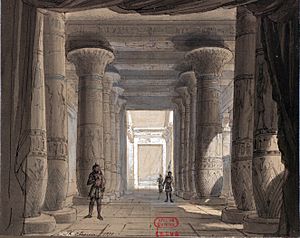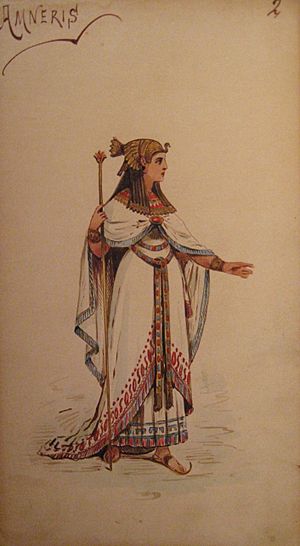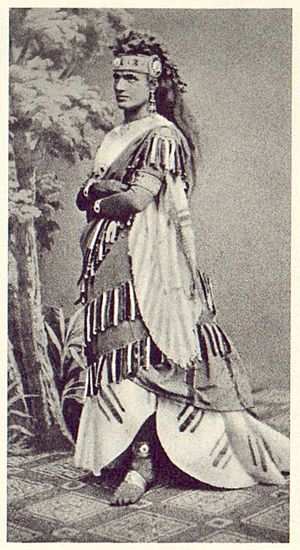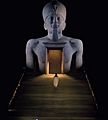Aida facts for kids
Quick facts for kids Aida |
|
|---|---|
| by Giuseppe Verdi | |
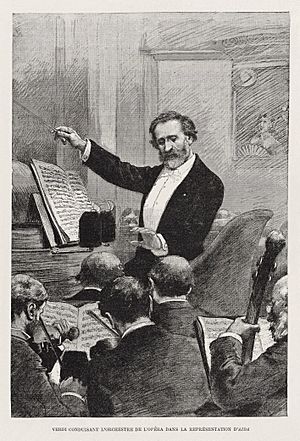
Verdi conducting Aida in Paris, 1881
|
|
| Genre | Opera in 4 acts |
| Librettist | Antonio Ghislanzoni |
| Language | Italian |
| Premiere | Khedivial Opera House Cairo December 24, 1871 |
| Other |
Operas by Verdi
|
Aida (pronounced "ah-EE-dah") is a famous Italian opera with music by Giuseppe Verdi. An opera is like a play where the story is told mostly through singing. The story and words, called the libretto, were written by Antonio Ghislanzoni. The idea for Aida came from a story by Auguste Mariette, a French expert on Egypt.
The opera was first performed in Cairo on December 24, 1871. The main character, Aida, is an Arabic girl's name meaning "visitor" or "returning".
Contents
The Story Behind Aida
In the 1860s, Giuseppe Verdi was a very well-known composer. He was often asked to write new operas. However, he was not happy with many of the stories, or librettos, that were offered to him.
In 1870, Verdi was asked to write an opera for the Khedive of Egypt. The Khedive wanted to celebrate a new theater in Cairo. At first, Verdi said no because he couldn't find a good story.
Then, a French Egyptologist named Auguste Mariette shared an idea for a story set in ancient Egypt. This idea interested Verdi. The story was turned into French words, and then into Italian by Antonio Ghislanzoni. This became the libretto for Aida.
What Happens in Aida?
The opera takes place in ancient Egypt, during the time of the Pharaohs. The Egyptians are fighting a war with the Ethiopians.
Aida is an Ethiopian princess. She has been captured and made a slave to Amneris, the daughter of the Egyptian King. No one in Egypt knows that Aida is a princess. Aida's father, Amonasro, is the King of Ethiopia. He plans to attack Egypt to free his daughter.
Meanwhile, Aida and Radames, a young Egyptian soldier, have fallen in love. But Amneris, the King's daughter, also loves Radames. She is very jealous and suspects that Radames loves someone else, but she doesn't know it's Aida.
Act 1: Love and War
Scene 1: In the Egyptian Palace
Radames hopes to lead the Egyptian army against the Ethiopians. Ramfis, the high priest, tells him that the gods have chosen the army's leader. Radames dreams of winning the war and marrying Aida. He sings about his love for her in a famous song called "Celeste Aida" ("Divine Aida").
Amneris enters. She loves Radames and wants him to be a hero. She notices how he looks worried when Aida comes in. Amneris wonders if Aida is the girl Radames loves.
The King, Ramfis, and the palace court arrive. A messenger announces that the Ethiopians, led by King Amonasro, are marching towards Thebes. The King declares that Egypt must fight. He names Radames as the leader of the army. Everyone leaves for the Temple of Vulcan. There, Radames will be blessed for his task.
Aida is left alone. She wants Radames to win, but she is also sad because he is fighting her own people. She sings "Ritorna Vincitor" ("Return the victor"). She feels torn between her love for Radames and her love for her father and her country. She asks the gods for pity.
Scene 2: Inside the Temple of Vulcan
In the dark temple, sacred weapons are given to Radames. Everyone prays for his success in battle. Priestesses perform a special dance. This scene is very serious and calm, a big change from the emotional scenes before it. Radames then joins the priests for more rituals.
Act 2: Victory and Deception
Scene 1: Amneris's Room
Two years later, Radames and the Egyptian army have won the war against the Ethiopians. There are dances to celebrate their victory. Amneris wants to find out if Aida and Radames truly love each other.
She talks to Aida. Amneris pretends to be sad that the Ethiopians lost. Aida says she can't be happy until she knows what happened to her father and brothers. Amneris then tells Aida a lie: she says Radames has been killed. When Aida cries, Amneris quickly says it was a lie and Radames is alive.
Aida is relieved, but Amneris becomes angry. She tells Aida that she knows about her love for Radames. Amneris also says she loves him. She threatens Aida, saying that Aida will be nothing while Amneris becomes queen.
Scene 2: The City Gate of Thebes
Radames and the Egyptian army march into the city to celebrate their victory. Captured Ethiopians are brought before the crowd. One of them is King Amonasro, Aida's father, but the Egyptians don't know who he is.
Aida rushes to her father. She tells the crowd that Amonasro is her father. Amonasro then tells the Egyptians a lie: he says the Ethiopian king (himself) was killed in battle. Aida, Amonasro, and the other captured Ethiopians beg the Egyptian King to spare them. The Egyptians want them put to death.
Radames asks the King to free Aida and Amonasro. The King rewards Radames by offering him the chance to be King of Egypt and marry his daughter, Amneris. Aida and Amonasro are kept as hostages. This is to make sure the Ethiopians don't try to get revenge.
Act 3: A Difficult Choice
On the Banks of the Nile
Amneris goes to pray before her wedding. Priests chant prayers. Aida wonders why Radames wants to meet her. Amonasro comes to Aida. He tells her she must find out from Radames which way the Egyptian army will march to fight the Ethiopians again.
Aida first refuses. But her father says that if she doesn't, and her people are killed, it will be her fault. Aida changes her mind.
When Radames arrives, Aida suggests they run away together. Radames first refuses, but Aida convinces him. He tells her the secret route the army will take. Amonasro, who has been secretly listening, then comes out. He reveals that he is the King of Ethiopia.
Radames feels he has betrayed his country by revealing a military secret. He refuses to run away with Aida and her father. Guards capture him.
Act 4: Judgment and Sacrifice
Scene 1: In the Temple of Justice
Amneris asks to see Radames. Radames refuses to defend himself. He is relieved to hear Aida is still alive and hopes she can return to her own country. Amneris is upset by this. Radames is tried in court. He still refuses to defend himself and is sentenced to death.
Scene 2: The Temple Vault
Amneris wants to save Radames, who is now a prisoner in a dark vault. Radames thinks he is alone. He is shocked and very happy when he finds Aida there. She had hidden herself in the vault. She tells him that she wants to die with him. That is their fate. As Amneris prays above, Aida dies in Radames' arms. THE END
Roles
| Role | Voice type | Premiere Cast, 24 December 1871. Conductor: Giovanni Bottesini |
European premiere 8 February 1872. Conductor: Franco Faccio |
|---|---|---|---|
| Aida, an Ethiopian princess | soprano | Antonietta Anastasi-Pozzoni | Teresa Stolz |
| The King of Egypt | bass | Tommaso Costa | Paride Pavoleri |
| Amneris, daughter of the King | mezzo-soprano | Eleonora Grossi | Maria Waldmann |
| Radames, Captain of the Guard | tenor | Pietro Mongini | Giuseppe Fancelli |
| Amonasro, King of Ethiopia | baritone | Francesco Steller | Francesco Pandolfini |
| Ramfis, high Priest | bass | Paolo Medini | Ormando Maini |
| A messenger | tenor | Luigi Stecchi-Bottardi | Luigi Vistarini |
| Voice of a Priestess | soprano | Marietta Allievi | |
| Priests, priestesses, ministers, captains, soldiers, officials, Ethiopians, slaves and prisoners, Egyptians, animals and chorus | |||
The Music of Aida
The music in Aida is considered excellent throughout the opera. It has both quiet, beautiful songs and big, powerful chorus numbers. Much of the music is very famous.
One well-known part is the aria that Radames sings at the beginning of Act One. He dreams of winning the battle and marrying Aida. This song is called Celeste Aida ("Heavenly Aïda").
Another very famous part is the Chorus in Scene 2 of Act 2, Gloria all'Egitto, ad Iside ("Glory to Egypt, to Isis!"). This is one of the most famous marches ever written.
Aida in Movies and Musicals
The opera Aida has been made into movies several times. For example, there was a film in 1953 starring Lois Maxwell and Sophia Loren. A Swedish movie version was made in 1987.
In 1998, the story of Aida was turned into a Broadway musical. The music for this musical was written by Elton John.
Images for kids
-
Radamès (Giuseppe Fancelli) and Aida (Teresa Stolz) in act 4, scene 2 of the 1872 La Scala European première (drawing by Leopoldo Metlicovitz)
-
Verdi conducting the 1880 Paris Opera premiere
-
A scene from the Israeli Opera production performed at Masada in 2011
See also
 In Spanish: Aida para niños
In Spanish: Aida para niños
 | James Van Der Zee |
 | Alma Thomas |
 | Ellis Wilson |
 | Margaret Taylor-Burroughs |


